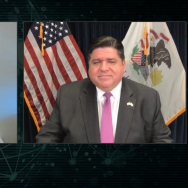In a year where the U.S. federal government invested $700 million in quantum information science research centers and institutes, it’s clear that quantum science is on the cusp of a revolution.
The third annual Chicago Quantum Summit, hosted virtually at the University of Chicago Nov. 11-13 by the Chicago Quantum Exchange, brought together more than 20 speakers from across the nation and attracted more than 1,000 attendees from 42 countries.
While quantum technologies have the potential to create next-generation computers and sensors, “the challenge and the opportunity for us lays in advancing the necessary fundamental science and engineering to scale this technology and to really build a quantum economy,” said David Awschalom, Liew Family Professor in Spintronics and Quantum Information at the University of Chicago, director of the Chicago Quantum Exchange, and director of the new U.S. Department of Energy Q-NEXT center at Argonne National Laboratory.
Investing in new quantum centers and institutes
This year’s summit comes on the heels of the announcement of five new U.S. Department of Energy National Quantum Information Science Research Centers and three new National Science Foundation Quantum Leap Challenge Institutes, authorized by the National Quantum Initiative Act.
“I see this as maybe the most compelling scientific enterprise of our time,” said Dan Stamper-Kurn, professor of physics at University of California, Berkeley who directs the NSF Challenge Institute for Quantum Computation. “If we can bring about a revolution in computation, we can revolutionize all science.”
The new centers and institutes comprise hundreds of researchers and students across dozens of universities, national laboratories, and industry partners. At the summit, each director gave an overview of their quantum center or institute goals. These ranged from eliminating decoherence (when quantum bits, or qubits, lose the information they hold), scaling quantum systems, building qubit technologies, developing algorithms for quantum computation, and creating new quantum devices.
The centers and institutes will also work together to share insights and common problems, and facilitate collaboration, including exchanging researchers to ensure “that the whole is greater than the sum of the parts,” said Steven Girvin, Eugene Higgins Professor of Physics at Yale University and director of the Co-design Center for Quantum Advantage. “We’re all trying to solve fantastically difficult problems. We will be much better at it in coordination.”
Each center will also help to train the quantum workforce of the future, through elementary and high school STEM programming, new university-level initiatives, and post-graduate training.
At the summit, Harriet Kung, deputy director for science programs in the Department of Energy’s Office of Science, said the agency has a long history of funding quantum research and hopes “these centers will be poised to accelerate the pace of the progress and also expand the scale of impact of quantum information science.”
Sethuraman Panchanathan, director of the National Science Foundation, said the foundation has funded partnerships, people, and translational work related to quantum research for 40 years and is now looking to strengthen that research with speed and scale.
“The support for basic research will continue to be the main focus of NSF,” he said. “We are going to continue to drive breakthroughs and advances across the spectrum of quantum science. That foundation has led to exciting new horizons for quantum science and technology.”
Building a regional quantum economy
At the summit, Illinois Governor J.B. Pritzker spoke about continuing to invest in infrastructure to ensure that Chicago and Illinois can become a commercial hub for quantum technology. “We have an opportunity to become an industry leader in this arena by getting into it early,” Pritzker said.
Three of the eight new federal centers and institutes are located in Illinois, demonstrating the strength of the research conducted at Illinois labs and universities. The State of Illinois committed $200 million for quantum research infrastructure at the University of Chicago and the University of Illinois at Urbana-Champaign.
“We created the opportunity for these awards to come to us,” he said. “They wouldn’t have come here if not for all the groundwork that we laid.”
While Illinois is a hub for quantum research, of the $1 billion in venture investment in quantum information science in North America, only $150,000 has been invested in Illinois.
That’s one of the reasons Penny Pritzker, founder and chairman of PSP Partners, Pritzker Realty Group, PSP Capital and PSP Growth and former U.S. Secretary of Commerce, co-founded P33, a nonprofit that aims to transform Chicago into a tech and innovation hub. “Without investment dollars, we will just be a research hub,” she said. To win the quantum race, the region needs to attract deep tech investors. “We need to do a lot more if we are going to seize one of the great economic opportunities our state has seen,” she said.
Nurturing quantum startups, now and in the future
While many large companies like Intel and Google are investing in quantum information science research, the quantum economic ecosystem also depends on startups to advance these leading-edge technologies.
Marc Singer, managing partner of venture capital firm Osage University Partners, said that while venture capitalists have a growing interest in funding quantum startups, it can be difficult for university startups to understand how their technology platform translates into a product. It takes many years and much funding to build the technology, and startups need to find a way to get market feedback during that timeframe.
“Ultimately, when we make an investment and its successful, it’s because they’ve built a great product, not because they have discovered great technology,” he said.
QEYnet, a startup out of Canada, is working to create a global microsatellite-enabled quantum key distribution network. Most secure information on the Internet is encrypted through public key encryption, which could someday be broken by quantum computers. In fact, bad actors are currently downloading encrypted information in order to “break” it once quantum computing becomes available.
QEYnet is now working to use satellites to transmit information with unbreakable quantum key distribution.
Other technologies, like quantum computing, have a longer time horizon. But startups like Zapata Computing, which is developing software for quantum computing, is working to secure the knowledge and IP needed to be successful in the future.
“If you don’t start now, you’re never going to be able to catch up, in the infrastructure sense and in the workforce development sense,” said Christopher Savoie, CEO and founder of the company. That said, there is a lot of hype around the field, and investors and the public need to be realistic about timelines of deliverables, he added.
“It takes time, and there are going to be visionaries and curmudgeons,” Savoie said. “I’m on the optimist side.”
—Adapted from an article that was originally published by the Chicago Quantum Exchange.

